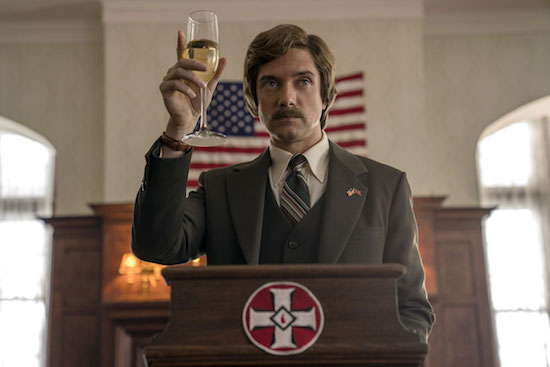Behind the brazen, stylised statement of its title, Spike Lee’s new joint BlacKkKlansman has got a piercing agenda that rises far above a straightforward condemnation of colourism. Immediately assuring audiences that the film they are about to see is “based on some fo’ real, fo’ real shit”, Lee’s latest takes on the Blaxploitation genre and white supremacism in 1970s America. But what’s really at play is a bigger, by no means incognito statement about the very real, very loud anger that shapes our political and personal identities today. And somehow, even the silent unreligious Jews sewn into America’s history get their own vocal retribution.
The fairly clear-cut premise sees Ron Stallworth (John David Washington), a rookie cadet in the Colorado Springs Police Department, going from basement archives to undercover assignments quickly enough. For his biggest trick, he makes his way as not only the first African American officer at Colorado Springs, but the first and only Black man to infiltrate the Ku Klux Klan.
All it takes is a five-minute phone call to a number quietly advertised in the newspaper for Stallworth to get an invitation to meet. But having used his real name and realizing that keyboard/phoneline warriors have different levels of responsibility in person, he needs to find some help. Enter Detective Philip “Flip” Zimmermann (Adam Driver).
Stallworth’s colleague offers the most simple front that the undercover agent needs – he’s white. So together, the unlikely pair become the all-American Ron Stallworth that the KKK is welcoming in to their community. The real Ron over the phone, understanding how easy it is to talk like a white man, and Flip, with his gauche, unassuming fair skin, in person. The plan could be foolproof – if it weren’t for that pesky, almighty “white Christian agenda”. Flip is Jewish.
Thus begins a deeper, stickier dive into a world of personal terror and cultural fascism operating with a vicious, suburban precision. While Ron builds trust through racist phone calls, Flip not only has to clinch his colleague’s identity as an adequate KKK candidate who hates anyone who isn’t white, but he also has to distance himself from his own uncertain religion at all costs.
“I never thought much about it, and now I’m thinking about it all the time”, Flip admits. Somewhere between the violent fight between black power and white power, there sit the non-religious Jews who must pick the right side of history or opt out of the beliefs in their blood to avoid any spillage. Lee doesn’t poke fun at this struggle in an obtuse or abrasive way, he just gives this anxiety a louder and more unexpected account than the quietly neurotic community has been accustomed to. The film reckons with this crisis with an equivalent brutality as is forced upon Stallworth’s titular fight, itself triggered by every throwaway “toad” mention under another police officer’s breath.

Much has been, should and will be written about the racial politics of BlacKkKlansman, inevitably prodded by the raw images of last year’s Charlottesville riots. Lee is never afraid to hit where it hurts, and with a subject matter that will no doubt be consumed by a mostly liberal, often white audience, it does make you wonder how much can or will be done in terms of substantial change – albeit allowing a raucous, cathartic laugh to ripple into awards season. But for the white Jews watching the film, who probably have never introduced themselves that way, it feels like a fresh kind of burn. It’s not vicious, but like when you have to rip off a plaster to avoid any deeper pain later, it still stings.
Adam Driver plays Flip with a deep self-awareness and complexity that begs for its own extended feature. Spitting abuse against “kikes” and “faggots” at gunpoint in one scene, aiming at a runaway target in the next, the layers of acting and reacting to absurd mundanities reward his performance as a Hollywood actor, but also as an unassuming human suddenly forced to identify what he was born with.
While selling his stakes as a trustworthy member of the Organisation (as the Klan members call themselves) Flip fuels the politics he desperately needs to preach. There’s manic fear on both sides of the white-Jewish strand of this conflict, in a way that’s just loud enough to make an impact in the bookended racial weight of BlacKkKlansman, but still quiet enough to go unnoticed by those living through daily systematic insecurity. “It’s a big fucking circle jerk”, Flip – as Ron – tells his Klan comrades.
It feels ironic that a story that opposes two factions – black and white – on the surface, is still dealing with an underlying anxiety that belies any violence based on physical discrimination alone. Spike Lee is certainly the director to tell the story that producer Jordan Peele needed (“he wanted a bad motherfucker to direct this”, Lee told Vanity Fair), but it feels both empowering and uncomfortably exposing that no-one is absolved from the discordant dissection of cultural identity at play. This film isn’t to blame for the feeling of anxiety and self-examination that sticks long after the thrill of a good time has worn off. It’s an urgent wake up call that triggers a protective instinct, begging for some kind of tangible action and acceptance. Lee has done his part; this white Jewish critic is still trying to do hers.
Blackkklansman is released by Universal Pictures


